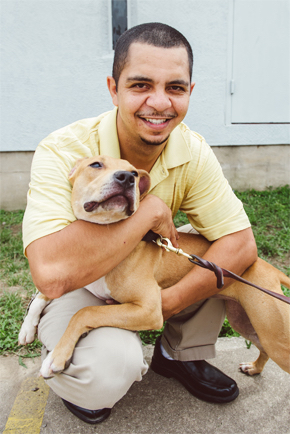How a dog, a dream and a death showed Rob Rosa life beyond bars
 September 9, 2016
Category: Feature, Featured, Medium, People
September 9, 2016
Category: Feature, Featured, Medium, People
Disclosures
Editor's note: This name of the organization mentioned in this article has been corrected to New Leash on Life USA. Edit 9/9 @3:20 p.m.Rob Rosa found brief liberation in reverie.
On this particular night in 2002, the Graterford inmate was dreaming of coming home to his grandmother in North Philadelphia. Growing up, before the heroin addiction and the drug dealing and the criminal conviction, Rosa’s grandparents would allow him to keep stray dogs and cats at his grandparents’ home in their doghouse.
He loved those animals.
In his dream, that doghouse was still in the yard. Standing beside it, clad in an elegant white dress, was Rosa’s grandmother. She approached him with comforting words before pointing out to an ocean cascading from the remnants of a shattered jail cell.
When Rosa turned back to his grandmother, she was gone. That’s when he was jolted back into consciousness, to his reality behind prison bars that were very much intact.
“When they turned the phones on that morning, I called my mother to tell her about the dream,” said Rosa, lifting his glasses to rub at the tears now rolling down his face. “‘Don’t tell me that,’ she said. ‘Your grandmom died last night.'”
Rosa had relapsed in prison when his grandfather died years earlier. He wasn’t about to let it happen again. Despite being four years from release, he had an out this time.
“Get me out of this prison,” Rosa recalls saying. “I want to do the dog program.”
That “dog program” was the precursor to what would eventually become New Leash On Life USA‘s prison program, where Rosa currently serves as vice president. The program rescues dogs from kill shelters and matches them with inmates, who then train them as a form of rehabilitation.
It saved Rosa’s life. But initially, he was wary.
“For the first few years of my sentence, I went in and engaged in the underground stuff that happens in the prison. I continued to use drugs, I didn’t participate in the jobs the prison offered or the education,” he said. “Some things you learn going through the system are that the government has its foot on your neck, the white man wants to keep you down — you start to believe those things. Especially when a judge tells you you’re a career criminal and tells you there’s no rehabilitation for you at the age of 13.”
The night before his dream, the inmate serving a life sentence in the cell next door told Rosa the dogs wouldn’t “do anything for him,” that he’d “end up right back in prison.” If it weren’t for the dream, Rosa might have believed him. Inside, Rosa knew better. He remembered training those strays at his grandparents.
Rosa began the program immediately. He recalled the humanity he felt working with the dogs and the transformation he felt within himself while training them. He remembered one dog in particular that showed him he could change — but it nearly cost him his life.
“They brought me a dog that had just been rescued from the shelter,” he said. “The dog was adopted and returned quite a few times because he didn’t know how to behave in the house. They were going to put him to sleep.”
While training in the yard one evening, the dog made a run for it. Rosa chased after him. The prison guards, not spotting the dog under the veil of night, drew their guns and activated the spotlights. Rosa’s chase was cut off in the nick of time by a security vehicle.
Rosa managed to clear everything up with a hasty explanation, and the dog was promptly found and returned. It wasn’t until Rosa began disciplining the pooch that he began to relate. It was almost as if the animal had known it put Rosa’s life in jeopardy.
“That dog had his issues, but I identified with them,” said Rosa. “It helped me to validate who I am because it confirmed that I’m a good person.”
And the dog was a good dog, acting out after time spent locked in a kill shelter.
That’s the point of New Leash On Life USA: There’s a personal connection that develops between inmates and rescue dogs, said Rosa. It’s a bond that helps inmates remember the good that inherently exists within them. It’s an experience Rosa now gets to relive every day.
“This is a reincarnation of my life every session we have. I see my past and I see the light at the end of the tunnel with the possibility of a future. I see people that know what loyalty is, who know what it is to commit to themselves,” he said. “That’s what reentry programs today should shoot for.”
Trending News










